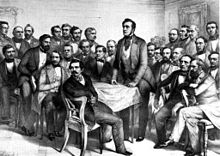
Frederick William IV, the eldest son and successor of Frederick William III of Prussia, was king of Prussia from 7 June 1840 until his death on 2 January 1861. Also referred to as the "romanticist on the throne", he was deeply religious and believed that he ruled by divine right. He feared revolutions, and his ideal state was one governed by the Christian estates of the realm rather than a constitutional monarchy.
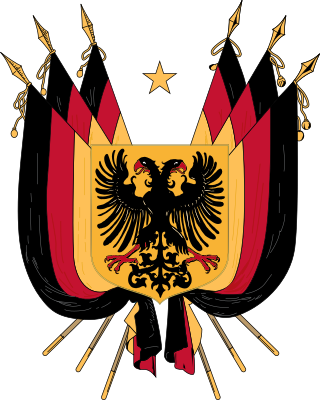
The Frankfurt National Assembly was the first freely elected parliament for all German states, including the German-populated areas of the Austrian Empire, elected on 1 May 1848.

The Deutscher Werkbund is a German association of artists, architects, designers and industrialists established in 1907. The Werkbund became an important element in the development of modern architecture and industrial design, particularly in the later creation of the Bauhaus school of design. Its initial purpose was to establish a partnership of product manufacturers with design professionals to improve the competitiveness of German companies in global markets. The Werkbund was less an artistic movement than a state-sponsored effort to integrate traditional crafts and industrial mass production techniques, to put Germany on a competitive footing with England and the United States. Its motto Vom Sofakissen zum Städtebau indicates its range of interest.

The Forty-eighters (48ers) were Europeans who participated in or supported the Revolutions of 1848 that swept Europe. In the German Confederation, the Forty-eighters favoured unification of Germany, a more democratic government, and guarantees of human rights. Although many Americans felt very sympathetic to their cause and were deeply saddened by their defeat, many Forty-Eighters were Freethinkers who were more influenced by post-1789 republicanism in France and the anti-religious ideas of The Enlightenment than the U.S. Constitution. In particular, their traditional hostility towards tolerating religious practice or Classical Christian education, often put them at odds with American Republicanism's belief in freedom of religion and the independence of religious institutions from control by the State. Disappointed at their failure to permanently change the system of government in the German States or the Austrian Empire, and sometimes ordered by local governments to emigrate because of their involvement in the revolution, they gave up their old lives to live abroad. They emigrated to Australia, the United Kingdom, and the United States. They included Germans, Czechs, Hungarians, Italians, among many others. A large number were respected, politically active, wealthy, and well-educated, and found success in their new countries.
This article aims to give a historical outline of liberalism in Germany. The liberal parties dealt with in the timeline below are, largely, those which received sufficient support at one time or another to have been represented in parliament. Not all parties so included, however, necessarily labeled themselves "liberal". The sign ⇒ denotes another party in that scheme.

A Burschenschaft is one of the traditional Studentenverbindungen of Germany, Austria, and Chile . Burschenschaften were founded in the 19th century as associations of university students inspired by liberal and nationalistic ideas. They were significantly involved in the March Revolution and the unification of Germany. After the formation of the German Empire in 1871, they faced a crisis, as their main political objective had been realized. So-called Reformburschenschaften were established, but these were dissolved by the Nazi regime in 1935/6. In West Germany, the Burschenschaften were re-established in the 1950s, but they faced a renewed crisis in the 1960s and 1970s, as the mainstream political outlook of the German student movement of that period started leaning more towards the left. Roughly 160 Burschenschaften exist today in Germany, Austria and Chile.
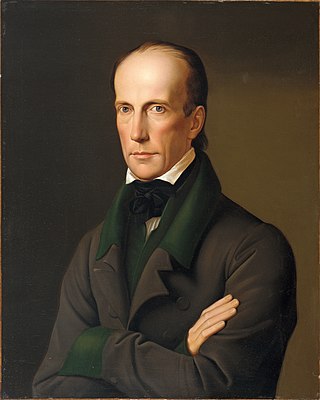
Archduke John of Austria, a member of the House of Habsburg-Lorraine, was an Austrian field marshal and imperial regent (Reichsverweser) of the short-lived German Empire during the Revolutions of 1848.
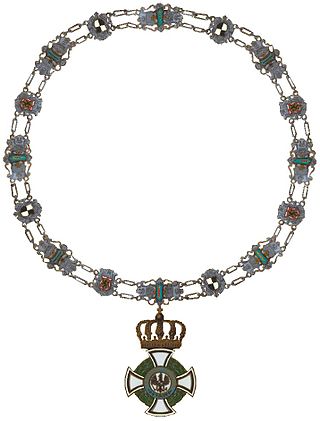
The House Order of Hohenzollern was a dynastic order of knighthood of the House of Hohenzollern awarded to military commissioned officers and civilians of comparable status. Associated with the various versions of the order were crosses and medals which could be awarded to lower-ranking soldiers and civilians.

This is a list of members of the 4th Reichstag – the parliament of the Weimar Republic, whose members were elected in the 1928 federal election and served in office from 1928 until its dissolution in 1930.

The Casino faction was a moderate liberal faction within the Frankfurt Parliament formed on 25 June 1848. Like most of the factions in the parliament, its name was a reference to the usual meeting place of its members in Frankfurt am Main. Casino was the largest and most influential faction at Paulskirche. Its members were for the most part national liberals.
The Baden Revolution of 1848/1849 was a regional uprising in the Grand Duchy of Baden which was part of the revolutionary unrest that gripped almost all of Central Europe at that time.
Christian Minkus represented Silesian constituencies of the former German provinces Rosenberg O.S. and Kreuzburg O.S. as a member of the Frankfurt Assembly.

Johann Karl Heinrich Wuttke was a German historian and politician.
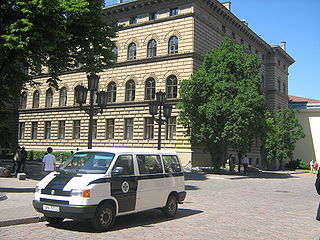
The Livonian Knighthood was a fiefdom that existed in Livonia. It was formed in 1561 by Baltic German nobles and disbanded in 1917 in Estonia, and in 1920 in Latvia. Like other Baltic knighthoods, the Livonian also had semi-autonomous privileged status in the Russian Empire.
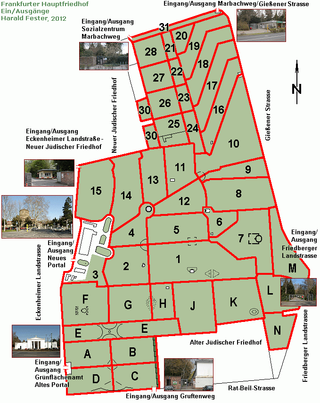
The Frankfurt Main Cemetery is the largest cemetery in Frankfurt am Main, Germany. It was opened in 1828. The cemetery is located directly adjacent to two Jewish cemeteries—the Old Jewish Cemetery and the New Jewish Cemetery, Frankfurt —and together they form one of the largest cemetery areas in Germany. The cemetery is noted for its many monumental graves, its garden architecture and as the site of the graves of many notable individuals.

Franz Duncker was a German publisher, left-liberal politician and social reformer.
Events from the year 1848 in Germany.
Landsberg was the name of faction that started in September 1848 as part of the National Assembly in Frankfurt. As with most factions of the National Assembly, the name refers to the usual place of assembly of the faction members in Frankfurt am Main.
Hugo Wesendonck was a German entrepreneur, lawyer and politician.
